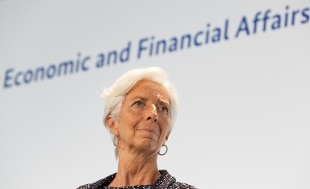Share
18 September 2020Too few women at the top: the President of the European Central Bank (ECB) Christine Lagarde, the first woman to head the ECB since November 2019, complains. In an interview with the French magazine Challenges, the former director general of the IMF he pointed the finger at the scarce presence of women in positions of responsibility in the world, "especially in the economic and financial fields, including central banks".
In short, women find it hard to break the so-called "glass ceiling" (a metaphor used to indicate a situation in which career advancement is prevented due to discrimination of racial or sexual origin) even within Eurotower itself: " Of the 25 members of the ECB's Governing Council, Executive Board member Isabel Schnabel and I are the only two women in the family photo. This is not normal, "Lagarde stressed.
The president of the ECB observes that "there is a certain awareness", but this is only "the beginning of the process".
Also because, he added, the coronavirus crisis has "made the situation of women more difficult".
"Women make up nearly 70% of the health professions; they are most at risk from a health point of view. With containment measures, they are on all fronts, they are forced to work while taking care of children, not to mention domestic violence, "he said, adding that" as in all economic crises, they are more at risk of losing their jobs or seeing their wages drop. "
There are still cultural closures to equality between men and women in various countries, said Lagrade, "there are all kinds, starting with the legal ones".
The president of the ECB then cites a report from the World Bank.
"On average - she explains - in the world women have only three quarters of the rights recognized to men. The disparities remain in the laws in some cases even in the Constitutions, in matrimonial law, succession law on the signing of contracts, access to credit" and he adds "in the last 50 years a lot of progress has been made, and France is well placed but in general on a world scale there is a long way to go".
The French debate on the certificate of virginity
France is divided on the "certificate of virginity", the government has announced its intention to formally ban virginity certificates, imposing sanctions against those who issue them but doctors ask not to criminalize the certificate .
"We are strongly opposed to virginity tests. It is a barbaric, backward and totally sexist practice", but it happens to have to provide a young woman with this document "to save her life and to protect her because she is weakened, vulnerable or threatened".
It is part of the appeal published in the Liberation newspaper by some French doctors and gynecologists, addressed to the government.
The doctors, signatories of the appeal, explained that they were opposed to the documents attesting the virginity of girls, a condition required by some families as an essential condition for celebrating a marriage, but, they explained that "far from protecting the Republic or promoting secularism, this measure would weaken the affected patients "and that the criminalization of virginity certificates does not serve the cause of women.
The "singular conference" with the patient must be used to listen to her, to help her become aware and free herself from male or family domination.
It also allows us to understand what hinders and threatens it.
Therefore, issuing this certificate is not playing in the hands of the fundamentalists who request it, quite the contrary.
What should shock public opinion is not that the doctor writes such a certificate without any legal value, but that in 2020 the requirement of virginity is still so widespread ", reads the appeal signed by doctors and gynecologists, who explain , "Most of the time we refuse to write such certificates and only agree to them if the situation appears to present a real danger.
When the victim is a minor, sometimes we turn to the prosecutor to protect him ".

